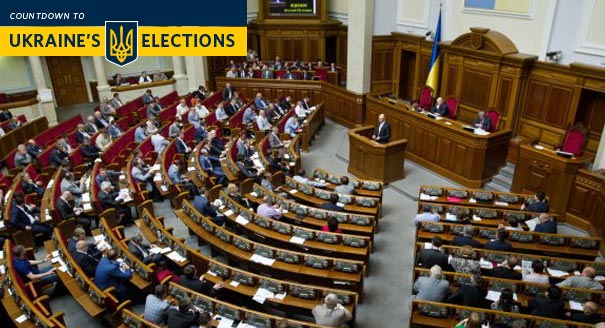Facing economic collapse, a winter without Russian natural gas, and a frozen conflict in the Donbas, a divisive election may be the last thing Ukraine needs. But on October 26, Ukrainians will head to the polls to elect a new parliament.
Fissures in the Pro-Europe Coalition
President Petro Poroshenko and Prime Minister Arseniy Yatsenyuk came into office vowing not to repeat the bitter experience of the 2004 October Revolution, which was thrown off-track by high-level infighting. Unfortunately, both men will lead separate political blocs during the Rada elections. Yatsenyuk reportedly decided not to join the Poroshenko bloc after the president refused to give him the number one spot on the party list, to guarantee him 30 percent of the party seats, and to change the name of the bloc to include Yatsenyuk’s political force. Following the breakdown in negotiations between the two leaders, the chairman of the Poroshenko bloc alleged that Yatsenyuk has his eyes set on the presidency. For his part, the more “hawkish” Yatsenyuk appears to be distancing himself from Poroshenko, should the president’s peace plan in the Donbas fail. The prime minister has shown far more skepticism about Russia’s willingness to follow through on the ceasefire agreement, arguing that the ultimate goal of President Vladimir Putin's regime is “to restore the Soviet Union, in one or another form.”
Who Speaks for the East?
Recent polling from the Democratic Initiatives Foundation (Kyiv) shows a dramatic collapse in support for the two parties that traditionally dominated politics in the Donbas, the Party of Regions and the Communist Party. Apathy is a complicating factor: 35 percent of former Party of Regions supporters and 22 percent of former Communist Party supporters do not plan to vote. In several districts in Donetsk Oblast, not a single candidate has registered to run for office. With no major political force mobilizing in the east, most candidates in Donetsk’s majoritarian districts, including former and current members of the Party of Regions, are running as independents, regardless of their actual political affiliation.
Rada Elections 101
The Verkhovna Rada failed to pass electoral reform legislation this summer, so the October 26 elections will take place under a mixed electoral system, which was used during the last parliamentary elections in 2012. Of the 450 seats in the Rada, 225 will be proportionally distributed to political parties that receive more than 5 percent of the vote. The remaining representatives will be chosen using single-member “majoritarian” districts with a plurality vote--much like the U.S. House of Representatives. The 12 majoritarian districts located on the Crimean peninsula will not be represented in the Rada, and there is little expectation that the separatist-controlled districts of Donetsk and Luhansk will participate in the election. This is reminiscent of what happened during the May 2014 presidential election and raises questions about who will speak on behalf of eastern Ukraine in the new parliament.
The Poroshenko Bloc’s Early Lead…
The Poroshenko Bloc holds a sizeable lead in early, fragmentary polling conducted in mid-September. The party, which includes leading representatives from civil society and the UDAR Party founded by Kyiv Mayor (and former heavyweight boxing champion) Vitaliy Klitschko, received support from roughly 27 percent of likely voters, according to the Democratic Initiatives Foundation Poll. (Note: the poll did not include UDAR as part of the Poroshenko Bloc in its results.)
… and the Surprising Strength of Ukrainian Nationalists
Oleh Lyashko’s Radical Party was the second most popular party according to the Democratic Initiatives Foundation poll. Lyashko’s emergence confounds earlier assessments that far-right nationalism had faded as an important political force. Lyashko is known for his fervently nationalistic and anti-Russia positions. He came in third in the presidential elections in May, receiving 8 percent of the national vote. Lyashko’s “Ukraine Battalion” has claimed responsibility for a violent attack on pro-Russian separatists in Torez, Donetsk that left one person dead and another severely wounded.

Soldiers Turned Statesmen
Several prominent paramilitary commanders, including Semen Semenchenko, the commander of the Donbas Battalion, are returning from the front and entering politics in Kyiv. The dramatic losses suffered by Ukrainian forces in towns like Ilovaysk in late August and early September, as well as allegations of high-level corruption during the war, have fed worries that some of these fighters will seek revenge against the political establishment. Dmytro Yarosh, the leader of the far-right group Praviy Sektor, has warned, "If Petro Poroshenko does not come to his senses, Ukraine will have a new president and commander in chief... If you don’t believe it, write a letter to [Viktor] Yanukovych.” The battalion commander of OUN, a nationalist group operating in eastern Ukraine, has proposed canceling the parliamentary elections, instituting a state of emergency, creating revolutionary tribunals, and destroying the oligarchy that continues to control much of political life.
The Lustration Paradox
In recent weeks, lustration of Yanukovych-era officials has become an obsession for politicians and political activists. Protesters demanding a “people’s lustration” have thrown lawmakers into trash cans and beaten up Party of Regions leaders. On September 16, the Rada passed a lustration bill that now awaits Poroshenko’s signature. The bill would likely lead to disruptive purges of officials and mid-level bureaucrats throughout the country and, if carried out properly, would deprive Ukraine of many of its most experienced lawmakers and recognizable leaders. Poroshenko appears to be on the fence about whether to sign the pending legislation, suggesting publicly that early parliamentary elections are the best means to renew the country’s political leadership. Unfortunately, the informal “lustration-by-election” method may allow a variety of unsavory characters to find their way into the new parliament: sixty legislators who voted for the draconian curbs on civil society in January are running for parliament again.
Yuliya Bila and Isaac Webb are junior fellows in the Carnegie Endowment for International Peace’s Russia and Eurasia Program.
